宾语从句讲解 图文
宾语从句详解ppt课件

可编辑ppt
5
定语从句
Wangcai is a dog that/which can guard house .
I’ll never forget the day when the earthquake happened.
先行词 关系词
用关系词引导的修饰名词或代词的从句叫定语 从句。
可编辑ppt
6
名词性从句:
在功能上相当于名词, 在复合句中能担任主 语、宾语、表语、同位语等
1. She wondered if the buses would still be
running.
宾语从句
2. The truth is that the fog is too thick for the bus to run that far. 表语从句
3. I know where he lives, but I don't know the exact address.
4. I have never heard of the book, so I
know nothing about it.
可编辑ppt
4
复合句:主句+从句
名词性从句
定语从句
状语从句
若主句谓语动词为think, consider, suppose, believe, expect, guess, imagine等,其后的宾语从句若含有否定 意义,一般要把否定词转移到主句谓语上,从句谓语
用肯定式。
I don’t think this dress fits you well.
我认为这件衣服不适合你穿。
可编辑ppt
23
三、语序 宾语从句的语序用陈述语序:
2024年宾语从句讲解ppt完整版

• 含蓄条件句:有时假设的情况并不以条件从句表示出来,而是通过一个 介词短语、副词或其他方式来表示。
• 虚拟语气在wish后的宾语从句中的应用:表示与现在事实相反的愿望, 从句用一般过去时;表示与过去事实相反的愿望,从句用过去完成时; 表示与将来事实相反的愿望,从句用could/would/might + 动词原形 。
当宾语从句是there be句 型时,引导词that可以省 略。
当宾语从句中的主语是it ,且谓语动词是系动词be 或seem时,引导词that 可以省略。
2024/3/1
10
03 宾语从句时态与语态
2024/3/1
11
主句为一般现在时时态与语态
主句为一般现在时,从句可以为 任意时态。
如果从句表达的是客观真理、普 遍真理或习惯性动作,则不受主 句时态限制,仍用一般现在时。
去时。
04 宾语从句中虚拟语气应 用
2024/3/1
15
虚拟语气基本概念及形式
虚拟语气定义
虚拟语气是一种特殊的动词形式,用 于表示与实际情况相反的假设、愿望 、建议等。
虚拟语气形式
虚拟语气的基本形式包括基本形式、 过去形式和完成形式。
2024/3/1
16
虚拟语气在宾语从句中应用
宾语从句中虚拟语气的使用
翻译练习
将中文句子翻译成英文,并使用宾语从句表达,例如“他 说他不知道这件事。”翻译为“He said that he didn’t know about it.”
2024/3/1
口语练习
模拟真实场景进行对话练习,使用宾语从句表达复杂的意 思或情感。
宾语从句经典讲解.ppt只是分享

注:由连接代词和连接副词引导的宾语从句,虽然从句具有疑问的语气,
但语序务必保持正常陈述语序。
语序的理解
注 意:
疑问语序
正常陈述语序
1.Where are you going?
practice:
1. “ I am doing my homework.” He said. He said (that) he was doing his homework
2. “I will come back.” Tom said. Tom said (that) he would come back
2.由连接代词和连接副词引导的宾语从句,引导词在从句中即做成
分,也有实际意义,所以不能省略。它是由特殊疑问句转化而来的。 请把下列句子合为一句:
a, I don't know b, When does the train leave? I don't know when the train leaves
3.Mary said: "I have been to XinJiang three times" Mary said (that) she had been to XinJiang three times
由连接代词what, which, who, whom, whose, 及连接 副词 when, where, how, why引导的宾语从句
A.What can I do for my father B.what I will get for my father
C.where I went with my father
初中英语宾语从句(共31张PPT)

在及物动词的后面可以接一个名词来充当宾语,如:
I know the man.
主谓
宾
而这时也可以用一个句子来充当宾语,这个句子就叫宾语从句,通常放在
主句谓语动词(及物动词)或介词。如:
I know that the man is a policeman.
主句 引导词 宾语从句
5
Part I 自主学习
3
考点精讲 1 宾语从句的定义
1. I know him. 2. Do you have the time? 3. I think that she is beautiful. 4. Why don’t you pay attention to me?
宾语,位于动词或者介词后。
4
考点精讲 1 宾语从句的定义
用that,whether,if,what,when,how,where,why,who等填空
1.Could you tell me ________ you worked out such a difficult problem? 2.I don't know________ we should do next. 3.No one is sure ________ robbed(抢劫) the village last night. 4.Do you know ________ the meeting will be held? Is it this afternoon? 5.I want to know ________ you have finished your school report or not.
C.where I can get a cup of coffee
初三宾语从句讲解ppt

9. I didn’t know whom the letters __w__e_r_e___ from. (be)
10. I didn’t know what time he _w__r_o_te__ the letter.
4. “ I am doing my homework.” He said. He said that he was doing his homework.
5. “I will come back.” Tom said. Tom said that he would come back.
6. “Is he doing his homework?” Jim asked. Jim asked if he was doing his homework.
注:that 在句中无词汇意义,在从句中不能充当成分,
在口语当中往往省略 e.g. 1. I hear (that) he will be back in an hour . 2. He said (that) he missed us very much . 3. The teacher told us (that) the earth moves around the sun.
me_______? A. why you are late again B. what were you doing then C. who you talked with D. how do you come to school
7. “When will he come back?” Tom asked.
初中英语宾语从句讲解(共49张PPT)
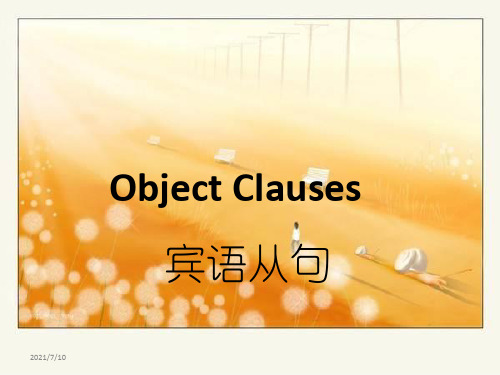
2021/7/10
(二)、语序 宾语从句的语序用陈述语序: 连接词+主语+谓语+其他成分
2021/7/10
主句+连接词+从句(主+谓+其他成分)
即:助动词不能放在主语前面。
1. When will he go to the library? His brother asks when he will go to the library . 2. What did he want to buy ? I don’t know what he wanted to buy .
eg: I don’t know what’s the matter.
做主语
Can you tell me who is over there? Can you tell me who he is ?
做宾语
2021/7/10
(三).宾语从句中时态的变化
填一填
I hear (that)
Jim was ( be ) a worker two years ago.
2021/7/10
宾语从句与简单句的转换
比一比
Байду номын сангаас
①
I I
don’t don’t
know know
where I should where to go.
注:that 在句中无词义,在从句中不能充 当句子成分,在口语中往往被省略。
2.由连接代词 Who,whom,whose,which,what和连接副词 where,how,why,when引导的宾语从句。这些连词既有词义又 充当句子成份。
高考语法之宾语从句精讲 40张PPT

高考语法之宾语从句精讲 40张PPTppt课件完美课件优秀课件公开 课课件
高考语法之宾语从句精讲 40张PPTppt课件完美课件优秀课件公开 课课件
which/whichever
在从句中可以充当定语和主语
You can take whichever you like. 你爱拿哪个就拿哪个吧。 I don't know which is your brother. 我不知道哪个是你哥哥。 I don't know which book is yours. 我不知道哪本书是你的。
高考语法之宾语从句精讲 40张PPTppt课件完美课件优秀课件公开 课课件
whose、whosever
在从句中可以充当定语
I wondered whose the coat it was. 我想知道这是谁的外套。 I do not know whose idea this was. 我不知道这是谁的想法。
高考语法之宾语从句精讲 40张PPTppt课件完美课件优秀课件公开 课课件
连接副词
定义:用来连接主从句的副词 作用:连接主句和从句,在从句中充当状语 分类:充当 时间状语:when, whenever
地点状语:where, wherever 方式状语:how, 原 因 状 语 : w h y,
高考语法之宾语从句精讲 40张PPTppt课件完美课件优秀课件公开 课课件
宾语从句详解完整ppt课件
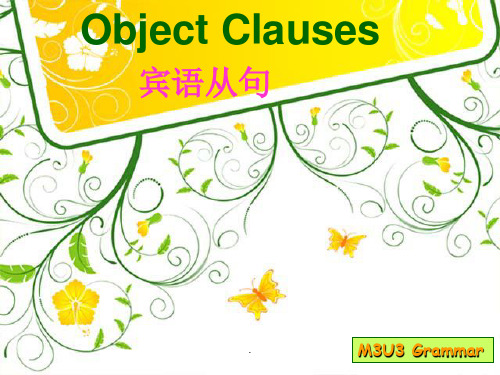
宾语从句
位于某些表情感的形容词、 谓语动词. 或者介词后
一、宾语从句的概念
从句在复合句中作宾语的名词性从句, 通常放在主句谓语动词(及物动词)或介词之后。
二、宾语从句三要素
引导词(连接词) 语序 时态
.
(一)引导词
1 由从属连词 that 引导的宾语从句
2 由从属连词 whether, if 引导的宾语从句
I may be in time to see him off. 3.Mary wrote an article on why the team had failed
to win the game. 4. A modern city has been set up in _w__h_a_t was a
移到主句谓语上,从句谓语用肯定式。
I don’t think this dress fits you well.
我认为这件衣服不适合你穿。
I don’t think you are right.
我认为你是错的。 我认为你今天无法完成工作。
I don’t believe you will finish th. e work today.
Object Clauses
宾语从句
.
M3U3 Grammar
什么是宾语?
• 1. He teaches us English. • 2. I am afraid that he won’t turn up. • 3. Do you agree with what he said ? • 4. I think (that) she is beautiful. • 5. Do you remember where we will
宾语从句详解课件(公开课)

单击此处添加副标题
目录
CONTENTS
01
02
03
04
05
06
什么是宾语?
I know him. Do you have the time? I think (that) she is beautiful. Why don’t you pay attention to me?
1. I want to know . Will he go to the park with us? =________________________________________ ___________________
I want to know if/whether he will go to the park with us.
01
04
02
03
Have you finished reading the book? I wondered.=I wondered if / whether you had finished reading the book.
Did you do your homework last night? I asked.= I asked if / whether you did your homework last night.
He can go with me. He said. =He said he could go with me.
01
时态:如果主句是过去的时态(一般过去时,过去进行时),从句的时态一定要用相对应的过去的某种时态(一般过去时,过去进行时,过去将来时,过去完成时)
02
It is going to rain. I thought. = I thought it was going to rain. 2) He is a worker. He told me.= He told me that he was a worker. 3) They will have a trip. He told me.= He told me that they would have a trip.
宾语从句讲解ppt课件
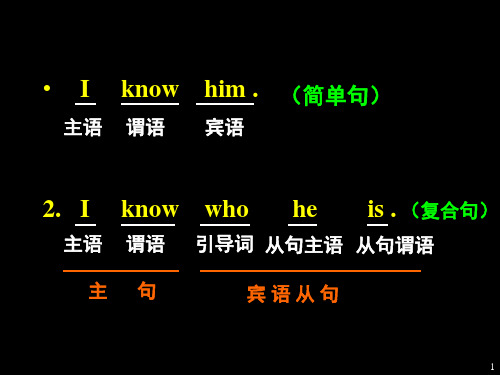
寒假来临,不少的高中毕业生和大学 在校生 都选择 去打工 。准备 过一个 充实而 有意义 的寒假 。但是 ,目前 社会上 寒假招 工的陷 阱很多
下列句子改为宾语从句时语序不变。
What’s the matter? What’ s wrong? What happened to you? What’s happening? Who teaches you English?
3
一、引导词 1. 当宾语从句是由陈述句变化而来,
由that引导,that在从句中不作任何成分,没 有具体含义,可以省略。
He is a clever boy. I think. I think (that) he is a clever boy.
Do you know? The famous singer will come to Yantai. Do you know that the famous singer will come to Yantai?
I asked him. How can I get so much money? I asked him how I could get so much money
Do you know ? When will the plane leave? Do you know when the plane will leave ?
19
寒假来临,不少的高中毕业生和大学 在校生 都选择 去打工 。准备 过一个 充实而 有意义 的寒假 。但是 ,目前 社会上 寒假招 工的陷 阱很多
变宾语从句四步骤:
确定引导词 改变人称 调整语序,时态 标点符号
20
寒假来临,不少的高中毕业生和大学 在校生 都选择 去打工 。准备 过一个 充实而 有意义 的寒假 。但是 ,目前 社会上 寒假招 工的陷 阱很多
宾语从句经典讲解PPT课件
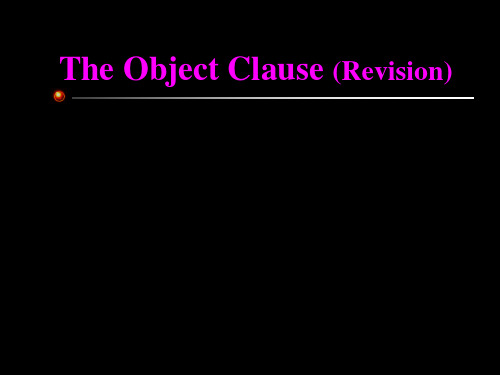
( 失败是成功之母)
.
15
1. The radio says it __w_i_ll_b_e___ cloudy tomorrow. (be) 2. The headmaster hopes everything __g_o_e_s_ well. (go)
3. Tom says that they _w__e_r_e_p_l_a_y_in_g_ (play) basketball at six o’clock yesterday evening.
(他是否跟我们一起去公园)
2. You ask him __w__h_e_th_e_r_/_if_h_e__c_a_n_c_o_m__e. (他是否能来)
3. I don’t knoww__h_et_h_e_r_i_t _is_g_o_i_n_g__to__ra_i_n_o_r_n_o_t__.
(是否要下雨还是不下雨)
4. I hear they h_a_v_e__r_e_tu_r_n_e(dreturn) it already.
5. He said that they _h_a_d__b_e_e_n_ members of the Party since 1948. (be)
6. He asked what they _w__e_re__d_o_i_n_g at eight last night. (do) 7. The teacher told his class that light _t_r_a_v_e_ls_ faster than
A.What can I do for my father B.what I will get for my father
C.where I went with my father
宾语从句(共41张PPT)
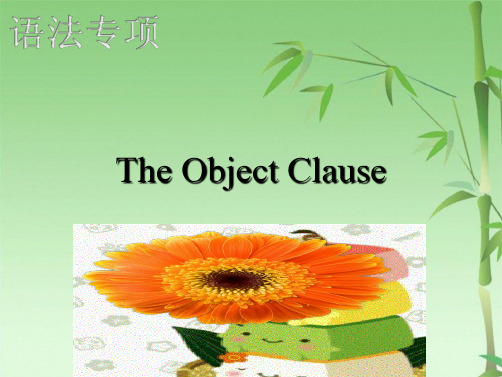
tomorrow.
❖He said that he had seen it .
3.当从句是客观真理,定义,公理,定理 时用一般现在时。
2. We don't know ____A__ they did it .
A. how B. who C. what
D. which
3. The teacher asks us ____ JimBcan come back on time .
A. that B. if
C. when D. what time
Could you please tell me where the restrooms are?
引导词是从句的一个成份,所以用哪个引导 词,看从句成份是否完
整,不完整,一定是特殊疑问句。完整,判断主句语气,是疑问语 气,用if/whether; 是肯定语气,用that.
1. 当宾语从句是陈述句时(包括肯定句和否定 句),连词由that引导,因为that在从句中不作 任何成分,也没有任何具体意思,因此在口语 或非正式文体中常省略
where he is 6. Could you tell me ______________________. (我该怎么去车站)
how I can get to the station 7. Would you tell me _________________(为什么火车迟到了)
why the train is late
❖Lin Tao feels (that) his own team is even better. ❖She says (that) she won’t take part in the sports meeting
《宾语从句》ppt课件完整版

《宾语从句》ppt课件完整版contents •宾语从句基本概念与结构•宾语从句中引导词用法•宾语从句时态与语序规则•宾语从句在复合句中应用举例•宾语从句与相似句型辨析•宾语从句常见错误及纠正方法目录宾语从句基本概念与结构定义及作用定义作用结构组成引导宾语从句的词,如that、whether、if等。
宾语从句中的主语,可以是名词、代词等。
宾语从句中的谓语,表示主语的动作或状态。
宾语从句中的宾语,可以是名词、代词等。
引导词主语谓语宾语分类与特点分类特点宾语从句具有完整的句子结构,可以独立成句;引导词在从句中不充当成分,无实际意义;宾语从句的语序一般为陈述句语序。
宾语从句中引导词用法引导陈述句thatwhether/ifwhether/if特殊疑问词+to do特殊疑问词引导特殊疑问句作为宾语从句,需根据句意选择合适的特殊疑问词,如what、where、when、why、how等。
如:Can you tell me how to get to the station? 你能告诉我怎么去车站吗?whether/if在极少数情况下,whether/if也可引导特殊疑问句作为宾语从句,但通常只用于表示选择或对比的语境中。
如:I'm wondering whether/if we should go by car or by train. 我在考虑我们是开车去还是坐火车去。
宾语从句时态与语序规则010204时态呼应规则主句为一般现在时,从句可为任意时态。
主句为过去时,从句为过去的某一时态。
主句为过去进行时,从句应用过去进行时或一般过去时。
主句为将来时或含有情态动词时,从句时态根据实际情况而定。
03语序调整原则注意事项及常见错误01020304宾语从句在复合句中应用举例并列连词连接两个宾语从句,如I don't know whether he will come or not. 我不知道他是否会来。
初中英语宾语从句课件(共28 张ppt)
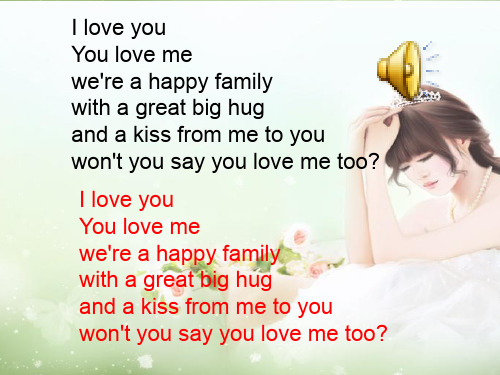
Many schools and houses were destroyed .I feel sorry, too. I don’t
knowhims主语v谓语o宾语simplesentence简单句s主语v谓语objectclause宾语从句连词从句主语从句谓语mainsentence主句compoundsentence复合句liuyinglikesenglish从句宾语objectclauseconceptobjectclause在复合句中作宾语的句子通常放在主句谓语动词或介词之后
复合句) I want to know _w__h_e_n____ the train __le_a_v_e_s___. 4. Did Peter come here yesterday? Li Lei wants to know. (改为
含宾语从句的复合句) Li Lei wants to know _i_f/_w_h_e_a? 2. "Does the girl need any help?” he asked me.(变为复合句) He asked me _if_/w__h_e_th__e_r the girl __n__e_e_d_e_d_ some help. 3. When does the train leave? I want to know.(改为含宾语从句的
什么是宾语?
I love you. You love me. I clap for him. You should look at me.
